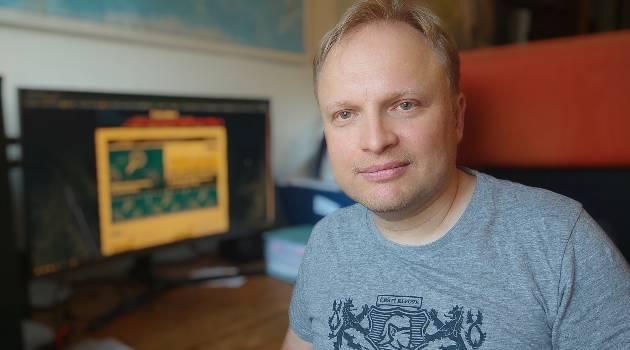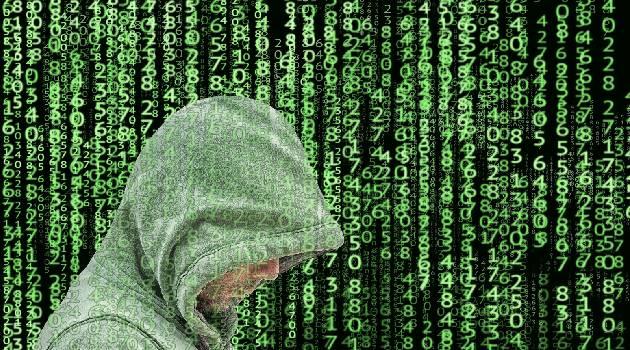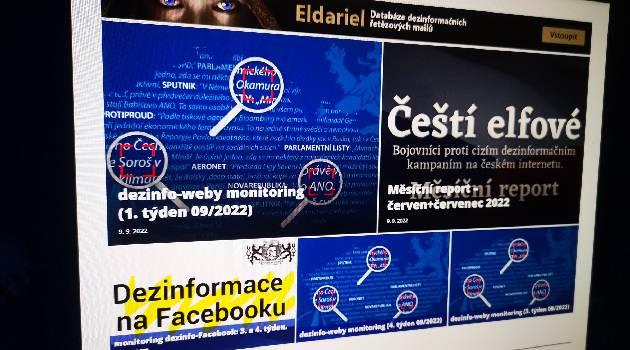Czech Elves' spokesperson: Populists will always abuse our emotions

The Czech Republic has its own Elves, too - they aren't just to be found in Germanic mythology or stories by Tolkien. These Elves work for free, independently, on a clear mission: Combating Internet trolls.
“The populists will always abuse our emotions. They either use them against you, or trade on your emotions against others,” says the Czech Elves’ spokesperson, Vít Kučík.
On what, exactly, is disinformation in the Czech environment currently focused?
The Czech Elves are involved with just a narrow segment of disinformation, and that is the campaigns of disinformation that enter Czech-language cyberspace from abroad, which are currently exclusively from Russia. These campaigns of disinformation involve various communications and motifs, called narratives. Some lie outright, others offer a mix of half-truths, others may use truths that have, of course, been absolutely taken out of context so that once they are arranged manipulatively next to each other they create a biased, untrue image. The campaigns of disinformation from Russia have already, for many years, generally involved two or three main aims that are veiled. Those aims are: Turning our country away from allies in the West; destroying our faith in our own authorities, such as bureaucracies, the Government and the media; and more recently, turning our citizens’ sympathies away from Ukraine.
The disinformers achieve these aims by disseminating hundreds of variations on different messages – narratives that always serve the same purpose. They exploit the problems and subjects of the day – for example, the crisis around immigration, Islamic radicalism, the COVID-19 epidemic, or currently, the war on Ukraine. We have documented the fluid transition of channels that are pro-Russian from resisting vaccinations, to accusing the Czech Government of “COVID-fascism”, to alleging Ukraine is a “fascist” state, to openly supporting Russia’s offensive war. Naturally, one of the subjects that these channels exploit is that of anti-Romani narratives. They know this theme emotionally resonates in Czech society, and therefore they abuse it to spark anti-Government sentiment and to cause fissures in the fellowship that we feel with one another in this society.
The Czech Elves (Čeští Elfové) are a civil movement that formed in 2018 along the lines of similar groups in the Baltics. They work for free, independently, in their spare time, to map, analyze and actively respond to the campaigns of disinformation from abroad that appear on the Czech Internet. Members of the group are artists, craftspeople, doctors, entrepreneurs, firefighters, police officers, scientists, soldiers, students and teachers. “We are those who refuse to just watch these targeted campaigns of disinformation from actors abroad, the aim of which is the inconspicuous destruction of the constitutional and democratic values upon which our country is based,” their website says.
That “spillover” of their attention from the antivaxxer subject matter to pro-Russian subject matter is something we were able to observe this summer, for example, in the case of Tomáš Čermák and Patrik Tušl, the disinformers who became famous after they were arrested in association with a video inciting hatred of refugees from Ukraine – previously, they had similarly attacked people associated with the measures to combat COVID-19.
As I have already outlined, the longtime operation of these campaigns of disinformation has created a robust base in the Czech Republic (and in other European countries it’s similar) in the form of a certain community of people who have alienated themselves, largely, from mainstream society. They are in basic opposition to all that is in the “majority”, they say they are against the “mainstream”, whether that be the Government, the authorities, the media, artists, a western orientation, liberal democracy, etc. This group has created its own philosophy and world view, it has its own system with its own stars, leaders, martyrs, methods of valuation, channels of information, meeting methods, etc. All of that is what we call the disinformation ecosystem. It’s a kind of parallel universe, and if you fall into this mindset, it is quite difficult to get out of it. It is very reminiscent of the religious sects of the 1970s and 1980s.
This ecosystem will take over any new occurrence or subject from the real world and adapt it to confirm its own vision of the world. When the theme was African migrants, they incorporated it as proof of an alleged plan hatched by mysterious global “elites” to destroy “Christian Europe”. When COVID-19 came, they transformed it into an alleged instrument for “subjugating” the world that had allegedly once been developed in a laboratory. When the immunization vaccine against COVID-19 came, they did not exult over that alleged “attempt to subjugate the world” being resolved, they alleged that the very vaccines themselves were the tool for controlling the world. When Russia invaded Ukraine, they spun it to allege that powerful global “elites” had provoked Russia to undertake this war so that those “elites” could then dominate the world. They always bring everything full circle.

Which subjects have been most frequent in recent months and weeks?
These campaigns of disinformation have long had two main subjects – being against national elites (the Government, the media) and being against the West. Six months ago they then added the theme of being against Ukraine. Those main topics are then being fulfilled through hundreds of variations on different narratives. It’s not possible to name them all, but they are accessible in our monthly and weekly reports on our website, www.cesti-elfove.cz. I don’t think it is important to know how they are specifically worded. It is not important to know whether they are accusing Ukraine of building secret biological laboratories or of having staged the Bucha massacre. What it is necessary to know is that both those ideas are just more of the endless variations on the main target, which is to undermine our sympathy for the West, for our own representatives, and for the media, to awaken distrust of everything that represents the real world and to draw us into their “alternative universe”.
You also mentioned anti-Romani narratives.
The issue of Romani people is, to a great extent, just a Czech and Slovak problem specifically, otherwise we would be hearing monstrous conspiracy theories about them globally, but such content is just exploited here and there by Czech and Slovak populists to attack the Government and score political points. The fact that the conspiracy disinformation globally does not include Romani-related subject matter proves it is being created from outside our country.
It is good at this point to recall the experience of Italy, though. Italy has been divided historically between the northern part, which is richer, and the south. The northern population frequently looked askance at southerners, just like some Czechs view Romani people. That was then exploited for a generation by the Northern League political party, which fought against the south, depicting southerners as “lazy people who do not want to work, who live on state support and cause crime and disorder”, attempting to get Italy’s north to secede, and through their renderings of the “southern enemy”, they scored political points in the north. They enjoyed success with this in the north, they got more than 30 % of the vote in some regions, but Italy-wide the party was small.
That changed radically, however, when a young Matteo Salvini took up the leadership, changed the party’s rhetoric, and found somebody not from Italy to serve as the enemy instead of their fellow citizens in the south – African immigrants. By doing so, he surprisingly won support in the south as well, and the Northern League became the second-strongest party Italy-wide. It was absurd to follow how southern voters cast ballots for the Northern League when the party, including Salvini, had only recently publicly called them “parasites living off of the work of people in the north”. Salvini, through this populist trick, gave the southerners the appearance of dignity – they were no longer “the very worst”, he began calling them “Italian patriots”, and “the very worst” became dark-skinned immigrants. Many southern Italians began, along with Salvini, to rain hatred down on this new enemy, out of relief – and they did so even harder than the northerners who had once despised them.

Something of the sort could most probably happen outside Italy as well…
This experience is a strong warning in any country for any minority in society – the populists will always abuse emotions and passions, either against you, or together with you against others. Disinformation media and the disinformation ecosystem as a whole serve that purpose. Don’t fall for it. No populist who turns their anger or fear against other minorities can defend any minority. What is in the interest of all minorities is a democratic state with clear rules to protect them, one that stands firm. That is exactly what the disinformation media are attacking systematically. Don’t fall for it, don’t allow yourself to be drawn into their parallel, sectarian universe, no matter how much they butter you up and claim that “you’re not the very worst anymore, we’ve found somebody else to blame for everything”. That is a lie, they do not care about you and they will turn against you as soon as it suits them.
How does disinformation spread the most?
The campaigns of disinformation from Russia access Czech cyberspace through three main channels. First there are about a dozen disinformation websites that then pour content into the other two channels, the chain e-mails and the social media. It’s a gradual process, it’s not possible to say which link in the chain is more important than the others. All three channels manage to reach as many as one million people; the intensity of this reach varies.
After Russia invaded Ukraine, several Czech-language disinformation websites were blocked temporarily. What impact did that have, from your perspective?
No blockade of the websites ever technically happened, it was just that accessing them became difficult for their users. On average, their traffic declined by half, roughly. Of course, that does not have much direct meaning – whoever wanted to, got access to the websites anyway – and this unique event lacked any solid anchoring in law or regulation. It was an extraordinary act at an extraordinary time, in short. Be that as it may, its indirect impact was important and quite positive. For the first time, the Government sent a clear signal that it can do something specific about these lying mouthpieces for propaganda if it wants to, that the Government is not as toothless as everybody has been led to believe. Some of the other and much bigger disinformers understood that message very well. For example, the largest such media outlet, “Parliament Papers” (Parlamentní listy), immediately began to delete approval of the invasion from its discussions online, and in the first months after the invasion, it also stopped printing grossly pro-Russian articles. They probably realized how a similar drop in traffic would damage their own business.

Was that step unprecedented, has anything of the sort been done before? Can this be compared, for example, to the blocking of White Media, the website that was so xenophobic?
There actually have been blockages of media outlets in the past for significantly violating the law, for example, by publishing racist content. Our legal system has always had this option, but that is not directly related to the blocking of those eight websites now, or with the campaigns that are pro-Russian.
What does it look like on the legal side – is there some specific legislative action on the way for cases of this type? What do you personally think is the most effective way to combat disinformation?
If somebody grossly violates the law through their publishing, then the courts and the repressive forces of the state already have the option of intervening and silencing that media outlet – there is no need for any special laws for this, they already exist in every country, including ours. They can ban the distribution of a book, of a recording, of a website, of a radio or television broadcast. After the Russian invasion of Ukraine, authorities in the Czech Republic considered creating a law that would make it easier for the Government to limit the spread of false foreign propaganda that seriously threatens the basic security of the state. They have such options already now, but they are formulated in very general terms, which creates some conjecture and uncertainty as to what the Government can afford to do. As far as I know, there is no concrete proposal to change the legislation yet.
I believe personally that since we have had a law on the media for decades that regulates the publication of the press, radio and television quite well, we now need to update it for media that are new, the content dissemination via the Internet, social networks, etc. Such a law would more clearly define for participants what their duties, responsibilities and rights are. This is not as easy as it seems at first glance, especially because this cannot be solved just on the national field, it is an international problem, which is why it is taking so long, but the developments are getting there. De-anonymizing their publishers and clarifying their responsibilities is not a panacea, but it would solve some of the problems. Other options are education about the media in schools, communication that is effective by the Government, that is strategic. These campaigns of disinformation are a complex problem requiring resolutions on many fronts, there is no easy recipe for them.
Photo: Archive of Vít Kučík / Pixabay
First published in Czech in the magazine Romano voďi www.romanovodi.cz
